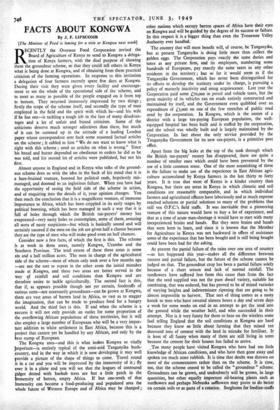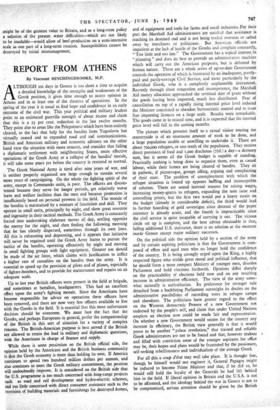FACTS ABOUT KONG WA
By J. F. LIPSCOMB
[The Minister of Food is leaving for a visit to Kongwa next week]
RECENTLY the Overseas Food Corporation invited the Board of Agriculture of Kenya to send to Kongwa a delega- tion of Kenya farmers, with the dual purpose of showing them the groundnut scheme, so that they could tell others in Kenya what is being done at Kongwa, and of obtaining from them practical criticism of the farming operations. In response to this invitation a delegation of four farmers recently spent five days at Kongwa. During their visit they were given every facility and encourage- ment to see the whole of the operational side of the scheme, and to meet as many as possible of the people engaged on it from top to bottom. They returned immensely impressed by two things ; firstly the scope of the scheme itself, and secondly the type of man employed in the field and the spirit with which he—and his wife If he has one—is tackling a tough job in the face of many disadvan- tages and a lot of unfair and biased criticism. Some of the criticisms deserve much stronger adjectives than these, but much of it can be summed up in the attitude of a leading London paper whose correspondent sent back some reasoned factual articles on the scheme ; it cabled to him "We do not want to know what is right with this scheme ; send us articles on what is wrong." Since his bread and butter depended on obedience to orders he did as he was told, and his second lot of articles were published, but not his first.
Almost anyone in England and in Kenya who talks of the ground- nut scheme does so with the idea in the back of his mind that it is a hare-brained venture, boosted for political ends, hopelessly mis- managed, and doomed to an inglorious failure. When you have had the opportunity of seeing the field side of the scheme in action, and of enquiring into the details of it, your opinion changes. You then reach the conclusion that it is a magnificent venture, of immense importance to Africa, which has been crippled in its early stages by political boosting, which has been managed in such a way that it is full of holes through which the British tax-payers' money has evaporated—very nasty holes to contemplate, some of them, arousing all sorts of nasty suspicions—but which is basically sound and will certainly succeed if the men on the job are given half a chance because they are the type of men who will make good even on half chances.
Consider now a few facts, of which the first is this. The scheme Is at work in three areas, namely Kongwa, Urambo and the Southern Province. The total extent of these three areas is some six and a half million acres. The men in charge of the agricultural side of the scheme—most of whom only took over a few months ago —are not the sort to repeat in the other areas the initial mistakes made at Kongwa, and these two areas are better served in the way of rainfall and soil conditions than Kongwa and are therefoie easier to tackle agriculturally. The second fact is this, that if, as appears possible though not yet certain, foodstuffs of various sorts—not necessarily groundnuts—can be grown at Kongwa, there are vast areas of barren land in Africa, so vast as to stagger the imagination, that can be made to produce food for a hungry world. And the third fact is this. If and when the scheme is a success it will not only provide an outlet for some proportion of the overflowing African populations of these territories, but it will also employ a large number of Europeans who will be a very impor- tant addition to white settlement in East Africa, because this is a project that cannot yet be handled by any African, and only by the best stamp of European.
The Kongwa area—and this is what makes Kongwa so vitally .Innpoitant—is entirely typical of the semi-arid Tanganyika bush- country, and in the way in which it is now developing it may well provide a picture of the shape of things to come. Travel round It in a car and you will be impressed by the immensity of it ; fly over it in a plane and you will see that the leagues of contoured ridges dotted with baobab trees are but a little patch in the inunensity of barren, empty Africa. If but one-tenth of that Immensity can become a food-producing and populated area the whole future of Western Europe and of Africa may be changed ; other nations which occupy barren spaces of Africa have their eyes on Kongwa and will be guided by the degree of its success or failure. In this respect it is a bigger thing than even the Tennessee Valley Authority ever handled.
The country that will most benefit will, of course, be Tanganyika, but at present Tanganyika is doing little more than collect the golden eggs. The Corporation pays exactly the same duties and taxes as any private firm, and its employees, numbering some hundreds of Europeans, pay exactly the same taxes as any other residents in the territory ; but so far it would seem as if the Tanganyika Government, which has never been distinguished for its efforts to develop the territory under its charge, is pursuing a policy of masterly inactivity and smug acquiescence. Last year the Corporation paid some £7o,000 in petrol and vehicle taxes, but the great majority of its vehicles ran on roads entirely constructed and maintained by itself, and the Government even quibbled over an expenditure of L3,000 on one of the few stretches of public road used by the corporation. In Kongwa, which is the centre of a district with a large tax-paying European population, the well- equipped hospital has been built and is staffed by the corporation, and the school was wholly built and is largely maintained by the Corporation. In fact about the only service provided by the Tanganyika Government for its new tax-payers, is a primitive post office.
Apart from the big leaks at the top of the tank through which the British tax-payers' money has disappeared, there are quite a number of smaller ones which could have been prevented by the use of a little common sense. One of the most astonishing of these is the failure to make use of the experience in East African agri- culture accumulated by Kenya farmers in the last thirty to forty years. It is true that most of Kenya is a kinder country than Kongwa, but there are areas in Kenya in which climatic and soil conditions are reasonably comparable, and in which individual farmers and agricultural officers have laboriously and at much expense reached solutions or partial solutions to many of the problems that still vex 0.F.C.'s field staffs. It was inevitable that a pioneering venture of this nature would have to buy a lot of experience, and that at a time of acute man-shortage it would have to start with many inexperienced brains and hands. But they were brains and hands that were keen to learn, and since it is known that the Member for Agriculture in Kenya was not backward in offers of assistance some of the experience that has been bought and is still being bought could have been had for the asking.
At present the partial failure of the rains over one area of country —as has happened this year—makes all the difference between success and partial failure, but the future of the scheme cannot be judged on that. The groundnut crop has been a partial failure solely because of a short season and lack of normal rainfall. The sunflowers have suffered less from this cause than front the fact that the seed supplied was not the pure dwarf variety, suitable for combining, that was ordered, but has proved to be of mixed varieties of varying heights and indeterminate ripening that are going to be almost impossible to harvest., That sort of thing comes as a nasty knock to men who have sweated sixteen hours a day and seven days a week for some weeks on end in an attempt to get the seed into the ground while the weather held, and who succeeded in their attempt. Nor is it very funny for them to hear on the wireless some fool telling England that the soil conditions at Kongwa are hard because they knew so little about farming that they mixed ten thousand tons of cement with the land in mistake for fertiliser. It is least of all funny when many of them are still living in tents because the cement for their houses has failed to arrive.
,Too many people have visited Kongwa who have had too little knowledge of African conditions, and who have then gone away and spoken too much utter rubbish. It is time that doubt was thrown on most of the commentators rather than on the scheme. It is time, too, that the scheme ceased to be called the " groundnut " scheme. Groundnuts can be grown, and undoubterly will be grown, in large quantities, but other equally important oil-bearing plants such as sunflowers and perhaps Nebraska safflowers may prove to do better on certain soils or as parts of a rotation. Sorghums for feeding-stuffs maight be of the greatest value to Britain, and as a long-term policy a solution of the present. water difficulties—which are not likely to be insoluble—would allow of beef-production on a semi-intensive scale as one part of a long-term rotation. Susceptibilities cannot be destroyed by initial mismanagement.



































 Previous page
Previous page